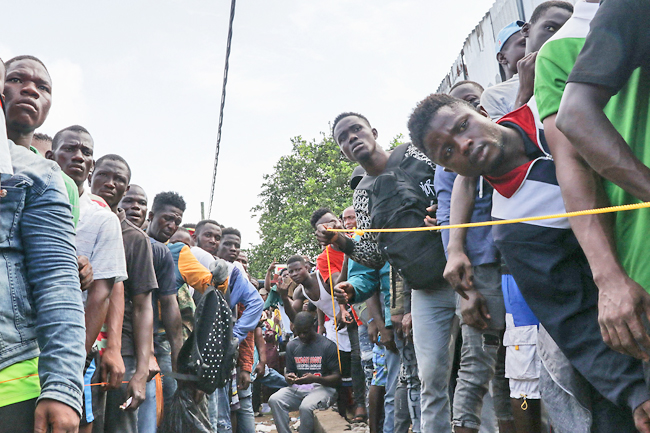MONROVIA (AFP) – In the Clara Town suburb of Liberia’s capital Monrovia, Aminata Kanneh stands sweating under the hot midday sun, queueing in a 100-metre-long line to buy rice.
“Today makes it two weeks that I have been coming every day, but until now I have not gotten a grain of rice,” the 34-year-old told AFP.
Liberians around the country have for weeks been queueing outside wholesalers to get their hands on the national staple food after rumours of a coming rice shortage began circling about six months ago.
Supply chain disruptions and Russia’s war in Ukraine have caused food shortages and high prices across much of the world.
But Liberia, a West African nation of five million people, has been hit particularly hard, with the government and United Nations (UN) blaming a delay in shipments.
Rice prices have steadily risen to about USD25 per 25-kilogramme bag, from the official rate of USD13, over the past six months.
“I can’t sell a bag for even USD20 right now because rice has become gold dust,” said Angeline Sandy, a 27-year-old retailer.

“I bought a bag for USD23 – I am selling it for USD30.”
Some 1.3 million people – more than a fifth of the population – live on less than USD2.15 per day, according to the World Bank.
One wholesaler who asked not to be named blamed the price hikes on the war in Ukraine, citing heightened freight costs.
“In neighbouring countries, rice is sold for more than USD20 (while) we are asking for only USD15 per bag,” he said.
“We are selling at a loss – we can’t continue.”
A spokesman for the UN World Food Programme, Djaounsede Madjiangar in West Africa said the rice shortage was due to “delays in the incoming consignment”.
“On the price of rice, it is definitely impacted by the crisis in Ukraine”, he said, adding that about seventy percent of Liberia’s staple food, including rice, is imported.
“As for many other countries in West Africa, the increase in domestic food prices reflects international food price trends, largely driven by the global energy crisis resulting from the Russia and Ukraine crisis,” he said.
This week the commerce ministry called on Liberians to “remain calm” and refrain from panic-buying, adding that more supplies were on the way.
It also urged retailers not to hoard the commodity.
“We want to assure the public that the current stock of rice in the country can serve the market up to the arrival of the next vessel which is expected in the coming days,” the Tuesday statement said.
It said the government has been subsidising importers to maintain a price cap on the staple product, and attributed “delays in incoming consignments” to a National Port Authority order in August to block vessels deemed defective from docking in the country.
One wholesaler told AFP that Liberia needs at least 50,000 metric tonnes of rice per month to satisfy demand.
The commerce ministry said that some 150,000 metric tonnes would arrive between mid-October and early November, which would supply the market until early next year. Another 22,000 metric tonnes were expected “in the coming days”, the statement said.
Liberia also faced fuel shortages earlier this year with prices spiking and motorists forced to wait in long queues outside gas stations.
One of the poorest countries in the world, Liberia is still recovering after back-to-back civil wars from 1989 to 2003 and West Africa’s 2014-16 Ebola crisis. The country also suffers from high inflation and regular cash shortages.
It ranks 178th out of 191 countries on the United Nation’s Human Development Index. A presidential election is slated for October 2023.





